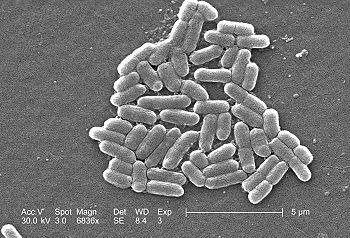Escherichia coli: Difference between revisions
imported>Caesar Schinas m (Bot: Update image code) |
imported>Howard C. Berkowitz No edit summary |
||
| Line 11: | Line 11: | ||
Outside the gut, it can be an opportunistic pathogen. At least one serotype, however, is a source of serious food infection. | Outside the gut, it can be an opportunistic pathogen. At least one serotype, however, is a source of serious food infection. | ||
===Serotype O157=== | ===Serology=== | ||
Substrains of the organism are characterized O:H, where O is the somatic antigen and H is the flagellar antigen. | |||
====Serotype O157:H57==== | |||
''Escherichia coli O157'' is a "verocytotoxin-producing serogroup belonging to the O subfamily of Escherichia coli which has been shown to cause severe food-borne disease. A strain from this serogroup, serotype H7, which produces shiga toxins, has been linked to human disease outbreaks resulting from contamination of foods by E. coli O157 from bovine origin."<ref>{{MeSH|Escherichia coli O157}}</ref><ref name="pmid3056169">{{cite journal |author=Griffin PM, Ostroff SM, Tauxe RV, ''et al'' |title=Illnesses associated with Escherichia coli O157:H7 infections. A broad clinical spectrum |journal=Ann. Intern. Med. |volume=109 |issue=9 |pages=705–12 |year=1988 |month=November |pmid=3056169 |doi= |url= |issn=}}</ref> | ''Escherichia coli O157'' is a "verocytotoxin-producing serogroup belonging to the O subfamily of Escherichia coli which has been shown to cause severe food-borne disease. A strain from this serogroup, serotype H7, which produces shiga toxins, has been linked to human disease outbreaks resulting from contamination of foods by E. coli O157 from bovine origin."<ref>{{MeSH|Escherichia coli O157}}</ref><ref name="pmid3056169">{{cite journal |author=Griffin PM, Ostroff SM, Tauxe RV, ''et al'' |title=Illnesses associated with Escherichia coli O157:H7 infections. A broad clinical spectrum |journal=Ann. Intern. Med. |volume=109 |issue=9 |pages=705–12 |year=1988 |month=November |pmid=3056169 |doi= |url= |issn=}}</ref> | ||
Food infections from this type have frequently propagated through industrially prepared ground beef. Contamination of a grinder has contaminated thousands of pounds, which were then packaged into [[hamburger]]s and sent to fast food restaurants. | Food infections from this type have frequently propagated through industrially prepared ground beef. Contamination of a grinder has contaminated thousands of pounds, which were then packaged into [[hamburger]]s and sent to fast food restaurants. | ||
====Serotype O25:H4==== | |||
A new strain, which demonstrates both virulence and antibiotic resistance, was isolated in Munich in 2000. In particular, it has CTX-M beta-lactamases, or beta-lactamases against [[cefotaxime]], previously an effective drug against gram-negative infections. It is a major source of serious urinary tract infections. <ref>{{citation | |||
| author = Johnson JR, Johnston B, Clabots C, Kuskowski MA, Castanheira M | |||
| title = ''Escherichia coli'' sequence type ST131 as the major cause of serious multidrug-resistant _E. coli_ infections in the United States | |||
| journal = Clin Infect Dis | year = 2010 | volume = 51 | issue 3 | pages= 286-94 | |||
| url = http://www.ncbi.nlm.nih.gov/pubmed/20572763}}</ref> | |||
==References== | ==References== | ||
<references/> | <references/> | ||
Revision as of 14:35, 3 August 2010
Escherichia coli (commonly known as E. coli), is a Gram-negative flagellated rod-shaped bacterium. It is facultatively anaerobic.
Pathology
It is one of the main species of bacteria living in the lower intestines of mammals, known as gut flora. However, the bacteria are not confined to this environment, and specimens have also been located, for example, on the edge of hot springs.
When located in the large instestine, it assists with waste processing, vitamin K production, and food absorption. Discovered in 1885 by Theodor Escherich, a German pediatrician and bacteriologist, E. coli are abundant: the number of individual E. coli bacteria in the feces that a human defecates in one day averages between 100 billion and 10 trillion. The "coliform count" is a surrogate marker for fecal contamination of water.
Outside the gut, it can be an opportunistic pathogen. At least one serotype, however, is a source of serious food infection.
Serology
Substrains of the organism are characterized O:H, where O is the somatic antigen and H is the flagellar antigen.
Serotype O157:H57
Escherichia coli O157 is a "verocytotoxin-producing serogroup belonging to the O subfamily of Escherichia coli which has been shown to cause severe food-borne disease. A strain from this serogroup, serotype H7, which produces shiga toxins, has been linked to human disease outbreaks resulting from contamination of foods by E. coli O157 from bovine origin."[1][2]
Food infections from this type have frequently propagated through industrially prepared ground beef. Contamination of a grinder has contaminated thousands of pounds, which were then packaged into hamburgers and sent to fast food restaurants.
Serotype O25:H4
A new strain, which demonstrates both virulence and antibiotic resistance, was isolated in Munich in 2000. In particular, it has CTX-M beta-lactamases, or beta-lactamases against cefotaxime, previously an effective drug against gram-negative infections. It is a major source of serious urinary tract infections. [3]
References
- ↑ Anonymous (2024), Escherichia coli O157 (English). Medical Subject Headings. U.S. National Library of Medicine.
- ↑ Griffin PM, Ostroff SM, Tauxe RV, et al (November 1988). "Illnesses associated with Escherichia coli O157:H7 infections. A broad clinical spectrum". Ann. Intern. Med. 109 (9): 705–12. PMID 3056169. [e]
- ↑ Johnson JR, Johnston B, Clabots C, Kuskowski MA, Castanheira M (2010), "Escherichia coli sequence type ST131 as the major cause of serious multidrug-resistant _E. coli_ infections in the United States", Clin Infect Dis 51: 286-94
